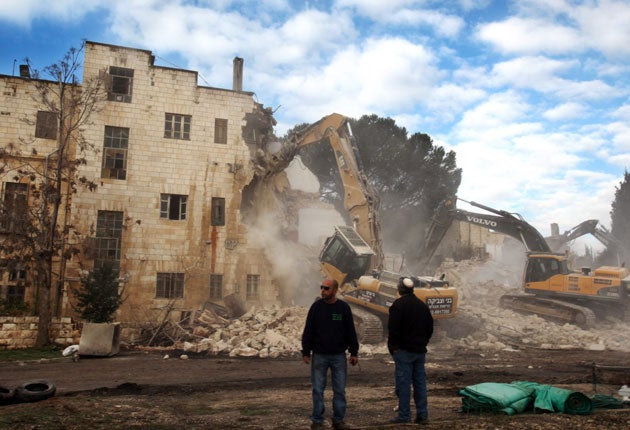Historic hotel flattened for settlements

Your support helps us to tell the story
From reproductive rights to climate change to Big Tech, The Independent is on the ground when the story is developing. Whether it's investigating the financials of Elon Musk's pro-Trump PAC or producing our latest documentary, 'The A Word', which shines a light on the American women fighting for reproductive rights, we know how important it is to parse out the facts from the messaging.
At such a critical moment in US history, we need reporters on the ground. Your donation allows us to keep sending journalists to speak to both sides of the story.
The Independent is trusted by Americans across the entire political spectrum. And unlike many other quality news outlets, we choose not to lock Americans out of our reporting and analysis with paywalls. We believe quality journalism should be available to everyone, paid for by those who can afford it.
Your support makes all the difference.Israeli bulldozers yesterday demolished a large part of a historic Palestinian hotel in Arab East Jerusalem as part of an internationally condemned plan to establish 20 new homes for Jewish settlers.
Three bulldozers moved into the compound of the old and empty Shepherd Hotel shortly after 6.30am and began destroying a main wing of the building, close to the British consulate-general in the Sheikh Jarrah district of the city. The high-profile demolition was carried out on behalf of the American millionaire Irving Moskowitz, a leading patron of Jewish settlement in East Jerusalem who bought the property in 1985 and finally obtained planning permission from the city municipality to build the new homes last year. The Obama administration expressed its disapproval at the time.
The move is the latest to expand Jewish settlements in East Jerusalem, unilaterally annexed by Israel after its victory in the 1967 Six Day War and wanted by the Palestinians as the capital of a future state. Settlement growth in East Jerusalem has been one of the issues halting direct negotiations between Israel and the moderate Ramallah-based Palestinian leadership. There has been a series of demonstrations in Sheikh Jarrah by mainly Israeli left-wing protesters angered by the eviction of local Palestinian families to make way for settlement growth, which is regarded, like the annexation itself, as illegal by most of the international community.
Within three hours of the unannounced demolition beginning, two containers were unloaded onto the site for use by the settlers. Security guards also erected a white corrugated iron barrier around the perimeter, already protected by a fence and barbed wire.
The British Foreign Office minister Alistair Burt yesterday condemned the demolition as a "provocative unilateral action" which hindered efforts to resume peace talks. The Palestinian Authority's Jerusalem governor, Adnan Husseini, said at the scene that the move was "very dangerous" and added: "They are destroying the history, memory, feelings of the Palestinian people."
The building was originally constructed in the 1930s for the Grand Mufti Amin Husseini, a relative of the current governor's, whose family still claims ownership. It was then operated after 1948 as a hotel under Jordanian rule. After 1967, it was taken over by the Israeli state and sold on under Israel's "absentee property" law.
Elisha Peleg, chairman of the Likud faction in the Jerusalem Municipality, said the move would "strengthen the Jewish foothold in east Jerusalem", adding that more such housing projects were needed "to prevent the city's division and maintain its unity".
But as Saeb Erekat, the Palestinian's chief negotiator, angrily gave warning there would "no negotiations" with Israel while such projects continued, Peace Now's Israeli director, Yariv Oppenheimer, said that the Israeli prime minister, Benjamin Netanyahu, and Jerusalem's mayor, Nir Barkat, had allowed Mr Moskowitz and his "extreme right-wing" allies to take over East Jerusalem.
Watching the demolition yesterday, Daniel Luria, a prominent leader of the Jewish settlement movement Ateret Cohanim, said in a reference to the Grand Mufti's wartime association with Hitler: "There is no sweeter sound than that of bulldozers destroying the house of a notorious Nazi."
But a report in Haaretz last year said that while owning the building, the Grand Mufti had not actually lived in it, and that it had been occupied in the 1940s by Katy Antonius, the socialite widow of a famous Palestinian nationalist, and the lover of the married British military governor Evelyn Barker.
US developer who wants to build 'a safe haven'
Irving Moskowitz: A highly successful 82-year-old Florida-based business magnate, Moskowitz built his fortune on hospitals and legal gambling. A qualified doctor who was born to Jewish immigrants from Poland in New York, he has estimated that up to 120 of his relatives may have perished in the holocaust.
He founded the philanthropic Moskowitz Foundation which declares on its website that its object is "to help people in need regardless of race, creed, politics or religion". At the same time he has been the benefactor of small settlements in inner East Jerusalem, mainly through the right-wing settlers' organisations Ateret Cohanim and Elad.
The foundation website says that the Holocaust "strengthened his conviction that Israel must be maintained as a safe haven for Jewish people from all over the world." It says that in Israel, "the Foundation supports a wide array of religious, educational, cultural and emergency services organisations."
Join our commenting forum
Join thought-provoking conversations, follow other Independent readers and see their replies
Comments